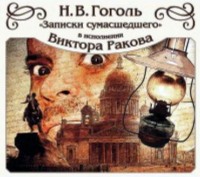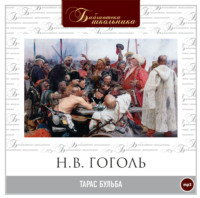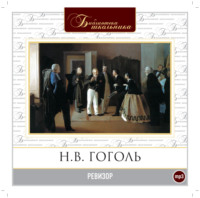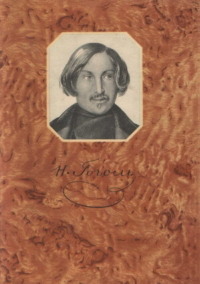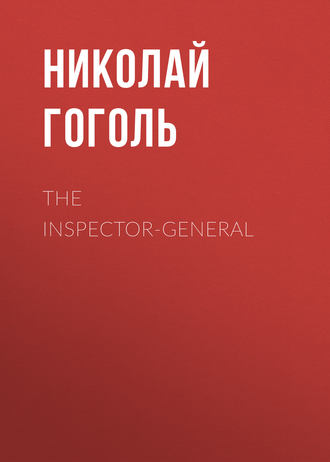 полная версия
полная версияThe Inspector-General
The Doctor makes the same sound as before.
AMMOS. No, there's no cure for it. He says his nurse struck him when he was a child, and ever since he has smelt of vodka.
GOVERNOR. Well, I just wanted to call your attention to it. As regards the internal administration and what Andrey Ivanovich in his letter calls "little peccadilloes," I have nothing to say. Why, of course, there isn't a man living who hasn't some sins to answer for. That's the way God made the world, and the Voltairean freethinkers can talk against it all they like, it won't do any good.
AMMOS. What do you mean by sins? Anton Antonovich? There are sins and sins. I tell everyone plainly that I take bribes. I make no bones about it. But what kind of bribes? White greyhound puppies. That's quite a different matter.
GOVERNOR. H'm. Bribes are bribes, whether puppies or anything else.
AMMOS. Oh, no, Anton Antonovich. But if one has a fur overcoat worth five hundred rubles, and one's wife a shawl—
GOVERNOR. [testily]. And supposing greyhound puppies are the only bribes you take? You're an atheist, you never go to church, while I at least am a firm believer and go to church every Sunday. You—oh, I know you. When you begin to talk about the Creation it makes my flesh creep.
AMMOS. Well, it's a conclusion I've reasoned out with my own brain.
GOVERNOR. Too much brain is sometimes worse than none at all.—However, I merely mentioned the courthouse. I dare say nobody will ever look at it. It's an enviable place. God Almighty Himself seems to watch over it. But you, Luka Lukich, as inspector of schools, ought to have an eye on the teachers. They are very learned gentlemen, no doubt, with a college education, but they have funny habits—inseparable from the profession, I know. One of them, for instance, the man with the fat face—I forget his name—is sure, the moment he takes his chair, to screw up his face like this. [Imitates him.] And then he has a trick of sticking his hand under his necktie and smoothing down his beard. It doesn't matter, of course, if he makes a face at the pupils; perhaps it's even necessary. I'm no judge of that. But you yourself will admit that if he does it to a visitor, it may turn out very badly. The Inspector, or anyone else, might take it as meant for himself, and then the deuce knows what might come of it.
LUKA. But what can I do? I have told him about it time and again. Only the other day when the marshal of the nobility came into the class-room, he made such a face at him as I had never in my life seen before. I dare say it was with the best intentions; But I get reprimanded for permitting radical ideas to be instilled in the minds of the young.
GOVERNOR. And then I must call your attention to the history teacher. He has a lot of learning in his head and a store of facts. That's evident. But he lectures with such ardor that he quite forgets himself. Once I listened to him. As long as he was talking about the Assyrians and Babylonians, it was not so bad. But when he reached Alexander of Macedon, I can't describe what came over him. Upon my word, I thought a fire had broken out. He jumped down from the platform, picked up a chair and dashed it to the floor. Alexander of Macedon was a hero, it is true. But that's no reason for breaking chairs. The state must bear the cost.
LUKA. Yes, he is a hot one. I have spoken to him about it several times. He only says: "As you please, but in the cause of learning I will even sacrifice my life."
GOVERNOR. Yes, it's a mysterious law of fate. Your clever man is either a drunkard, or he makes such grimaces that you feel like running away.
LUKA. Ah, Heaven save us from being in the educational department! One's afraid of everything. Everybody meddles and wants to show that he is as clever as you.
GOVERNOR. Oh, that's nothing. But this cursed incognito! All of a sudden he'll look in: "Ah, so you're here, my dear fellows! And who's the judge here?" says he. "Liapkin-Tiapkin." "Bring Liapkin-Tiapkin here.—And who is the Superintendent of Charities?" "Zemlianika."—"Bring Zemlianika here!"—That's what's bad.
SCENE IIEnter Ivan Kuzmich, the Postmaster.
POSTMASTER. Tell me, gentlemen, who's coming? What chinovnik?
GOVERNOR. What, haven't you heard?
POSTMASTER. Bobchinsky told me. He was at the postoffice just now.
GOVERNOR. Well, what do you think of it?
POSTMASTER. What do I think of it? Why, there'll be a war with the Turks.
AMMOS. Exactly. Just what I thought.
GOVERNOR [sarcastically]. Yes, you've both hit in the air precisely.
POSTMASTER. It's war with the Turks for sure, all fomented by the French.
GOVERNOR. Nonsense! War with the Turks indeed. It's we who are going to get it, not the Turks. You may count on that. Here's a letter to prove it.
POSTMASTER. In that case, then, we won't go to war with the Turks.
GOVERNOR. Well, how do you feel about it, Ivan Kuzmich?
POSTMASTER. How do I feel? How do YOU feel about it, Anton Antonovich?
GOVERNOR. I? Well, I'm not afraid, but I just feel a little—you know—The merchants and townspeople bother me. I seem to be unpopular with them. But the Lord knows if I've taken from some I've done it without a trace of ill-feeling. I even suspect—[Takes him by the arm and walks aside with him.]—I even suspect that I may have been denounced. Or why would they send an Inspector to us? Look here, Ivan Kuzmich, don't you think you could—ahem!—just open a little every letter that passes through your office and read it—for the common benefit of us all, you know—to see if it contains any kind of information against me, or is only ordinary correspondence. If it is all right, you can seal it up again, or simply deliver the letter opened.
POSTMASTER. Oh, I know. You needn't teach me that. I do it not so much as a precaution as out of curiosity. I just itch to know what's doing in the world. And it's very interesting reading, I tell you. Some letters are fascinating—parts of them written grand—more edifying than the Moscow Gazette.
GOVERNOR. Tell me, then, have you read anything about any official from St. Petersburg?
POSTMASTER. No, nothing about a St. Petersburg official, but plenty about Kostroma and Saratov ones. A pity you don't read the letters. There are some very fine passages in them. For instance, not long ago a lieutenant writes to a friend describing a ball very wittily.—Splendid! "Dear friend," he says, "I live in the regions of the Empyrean, lots of girls, bands playing, flags flying." He's put a lot of feeling into his description, a whole lot. I've kept the letter on purpose. Would you like to read it?
GOVERNOR. No, this is no time for such things. But please, Ivan Kuzmich, do me the favor, if ever you chance upon a complaint or denunciation, don't hesitate a moment, hold it back.
POSTMASTER. I will, with the greatest pleasure.
AMMOS. You had better be careful. You may get yourself into trouble.
POSTMASTER. Goodness me!
GOVERNOR. Never mind, never mind. Of course, it would be different if you published it broadcast. But it's a private affair, just between us.
AMMOS. Yes, it's a bad business—I really came here to make you a present of a puppy, sister to the dog you know about. I suppose you have heard that Cheptovich and Varkhovinsky have started a suit. So now I live in clover. I hunt hares first on the one's estate, then on the other's.
GOVERNOR. I don't care about your hares now, my good friend. That cursed incognito is on my brain. Any moment the door may open and in walk—
SCENE IIIEnter Bobchinsky and Dobchinsky, out of breath.
BOBCHINSKY. What an extraordinary occurrence!
DOBCHINSKY. An unexpected piece of news!
ALL. What is it? What is it?
DOBCHINSKY. Something quite unforeseen. We were about to enter the inn—
BOBCHINSKY [interrupting]. Yes, Piotr Ivanovich and I were entering the inn—
DOBCHINSKY [interrupting]. Please, Piotr Ivanovich, let me tell.
BOBCHINSKY. No, please, let me—let me. You can't. You haven't got the style for it.
DOBCHINSKY. Oh, but you'll get mixed up and won't remember everything.
BOBCHINSKY. Yes, I will, upon my word, I will. PLEASE don't interrupt! Do let me tell the news—don't interrupt! Pray, oblige me, gentlemen, and tell Dobchinsky not to interrupt.
GOVERNOR. Speak, for Heaven's sake! What is it? My heart is in my mouth! Sit down, gentlemen, take seats. Piotr Ivanovich, here's a chair for you. [All seat themselves around Bobchinsky and Dobchinsky.] Well, now, what is it? What is it?
BOBCHINSKY. Permit me, permit me. I'll tell it all just as it happened. As soon as I had the pleasure of taking leave of you after you were good enough to be bothered with the letter which you had received, sir, I ran out—now, please don't keep interrupting, Dobchinsky. I know all about it, all, I tell you.—So I ran out to see Korobkin. But not finding Korobkin at home, I went off to Rastakovsky, and not seeing him, I went to Ivan Kuzmich to tell him of the news you'd got. Going on from there I met Dobchinsky—
DOBCHINSKY [interjecting]. At the stall where they sell pies—
BOBCHINSKY. At the stall where they sell pies. Well, I met Dobchinsky and I said to him: "Have you heard the news that came to Anton Antonovich in a letter which is absolutely reliable?" But Piotr Ivanovich had already heard of it from your housekeeper, Avdotya, who, I don't know why, had been sent to Filipp Antonovich Pachechuyev—
DOBCHINSKY [interrupting]. To get a little keg for French brandy.
BOBCHINSKY. Yes, to get a little keg for French brandy. So then I went with Dobchinsky to Pachechuyev's.—Will you stop, Piotr Ivanovich? Please don't interrupt.—So off we went to Pachechuyev's, and on the way Dobchinsky said: "Let's go to the inn," he said. "I haven't eaten a thing since morning. My stomach is growling." Yes, sir, his stomach was growling. "They've just got in a supply of fresh salmon at the inn," he said. "Let's take a bite." We had hardly entered the inn when we saw a young man—
DOBCHINSKY [Interrupting]. Of rather good appearance and dressed in ordinary citizen's clothes.
BOBCHINSKY. Yes, of rather good appearance and dressed in citizen's clothes—walking up and down the room. There was something out of the usual about his face, you know, something deep—and a manner about him—and here [raises his hand to his forehead and turns it around several times] full, full of everything. I had a sort of feeling, and I said to Dobchinsky, "Something's up. This is no ordinary matter." Yes, and Dobchinsky beckoned to the landlord, Vlas, the innkeeper, you know,—three weeks ago his wife presented him with a baby—a bouncer—he'll grow up just like his father and keep a tavern.—Well, we beckoned to Vlas, and Dobchinsky asked him on the quiet, "Who," he asked, "is that young man?" "That young man," Vlas replied, "that young man"—Oh, don't interrupt, Piotr Ivanovich, please don't interrupt. You can't tell the story. Upon my word, you can't. You lisp and one tooth in your mouth makes you whistle. I know what I'm saying. "That young man," he said, "is an official."—Yes, sir.—"On his way from St. Petersburg. And his name," he said, "is Ivan Aleksandrovich Khlestakov, and he's going," he said "to the government of Saratov," he said. "And he acts so queerly. It's the second week he's been here and he's never left the house; and he won't pay a penny, takes everything on account." When Vlas told me that, a light dawned on me from above, and I said to Piotr Ivanovich, "Hey!"—
DOBCHINSKY. No, Piotr Ivanovich, I said "HEY!"
BOBCHINSKY. Well first YOU said it, then I did. "Hey!" said both of us, "And why does he stick here if he's going to Saratov?"—Yes, sir, that's he, the official.
GOVERNOR. Who? What official?
BOBCHINSKY. Why, the official who you were notified was coming, the Inspector.
GOVERNOR [terrified]. Great God! What's that you're saying. It can't be he.
DOBCHINSKY. It is, though. Why, he doesn't pay his bills and he doesn't leave. Who else can it be? And his postchaise is ordered for Saratov.
BOBCHINSKY. It's he, it's he, it's he—why, he's so alert, he scrutinized everything. He saw that Dobchinsky and I were eating salmon—chiefly on account of Dobchinsky's stomach—and he looked at our plates so hard that I was frightened to death.
GOVERNOR. The Lord have mercy on us sinners! In what room is he staying?
DOBCHINSKY. Room number 5 near the stairway.
BOBCHINSKY. In the same room that the officers quarreled in when they passed through here last year.
GOVERNOR. How long has he been here?
DOBCHINSKY. Two weeks. He came on St. Vasili's day.
GOVERNOR. Two weeks! [Aside.] Holy Fathers and saints preserve me! In those two weeks I have flogged the wife of a non-commissioned officer, the prisoners were not given their rations, the streets are dirty as a pothouse—a scandal, a disgrace! [Clutches his head with both hands.]
ARTEMY. What do you think, Anton Antonovich, hadn't we better go in state to the inn?
AMMOS. No, no. First send the chief magistrate, then the clergy, then the merchants. That's what it says in the book. The Acts of John the Freemason.
GOVERNOR. No, no, leave it to me. I have been in difficult situations before now. They have passed off all right, and I was even rewarded with thanks. Maybe the Lord will help us out this time, too. [Turns to Bobchinsky.] You say he's a young man?
BOBCHINSKY. Yes, about twenty-three or four at the most.
GOVERNOR. So much the better. It's easier to pump things out of a young man. It's tough if you've got a hardened old devil to deal with. But a young man is all on the surface. You, gentlemen, had better see to your end of things while I go unofficially, by myself, or with Dobchinsky here, as though for a walk, to see that the visitors that come to town are properly accommodated. Here, Svistunov. [To one of the Sergeants.]
SVISTUNOV. Sir.
GOVERNOR. Go instantly to the Police Captain—or, no, I'll want you. Tell somebody to send him here as quickly as possibly and then come back.
Svistunov hurries off.
ARTEMY. Let's go, let's go, Ammos Fiodorovich. We may really get into trouble.
AMMOS. What have you got to be afraid of? Put clean nightcaps on the patients and the thing's done.
ARTEMY. Nightcaps! Nonsense! The patients were ordered to have oatmeal soup. Instead of that there's such a smell of cabbage in all the corridors that you've got to hold your nose.
AMMOS. Well, my mind's at ease. Who's going to visit the court? Supposing he does look at the papers, he'll wish he had left them alone. I have been on the bench fifteen years, and when I take a look into a report, I despair. King Solomon in all his wisdom could not tell what is true and what is not true in it.
The Judge, the Superintendent of Charities, the School Inspector, and Postmaster go out and bump up against the Sergeant in the doorway as the latter returns.
SCENE IVThe Governor, Bobchinsky, Dobchinsky, and Sergeant Svistunov.
GOVERNOR. Well, is the cab ready?
SVISTUNOV. Yes, sir.
GOVERNOR. Go out on the street—or, no, stop—go and bring—why, where are the others? Why are you alone? Didn't I give orders for Prokhorov to be here? Where is Prokhorov?
SVISTUNOV. Prokhorov is in somebody's house and can't go on duty just now.
GOVERNOR. Why so?
SVISTUNOV. Well, they brought him back this morning dead drunk. They poured two buckets of water over him, but he hasn't sobered up yet.
GOVERNOR [clutching his head with both hands]. For Heaven's sake! Go out on duty quick—or, no, run up to my room, do you hear? And fetch my sword and my new hat. Now, Piotr Ivanovich, [to Dobchinsky] come.
BOBCHINSKY. And me—me, too. Let me come, too, Anton Antonovich.
GOVERNOR. No, no, Bobchinsky, it won't do. Besides there is not enough room in the cab.
BOBCHINSKY. Oh, that doesn't matter. I'll follow the cab on foot—on foot. I just want to peep through a crack—so—to see that manner of his—how he acts.
GOVERNOR [turning to the Sergeant and taking his sword]. Be off and get the policemen together. Let them each take a—there, see how scratched my sword is. It's that dog of a merchant, Abdulin. He sees the Governor's sword is old and doesn't provide a new one. Oh, the sharpers! I'll bet they've got their petitions against me ready in their coat-tail pockets.—Let each take a street in his hand—I don't mean a street—a broom—and sweep the street leading to the inn, and sweep it clean, and—do you hear? And see here, I know you, I know your tricks. You insinuate yourselves into the inn and walk off with silver spoons in your boots. Just you look out. I keep my ears pricked. What have you been up to with the merchant, Chorniayev, eh? He gave you two yards of cloth for your uniform and you stole the whole piece. Take care. You're only a Sergeant. Don't graft higher than your rank. Off with you.
SCENE VEnter the Police Captain.
GOVERNOR. Hello, Stepan Ilyich, where the dickens have you been keeping yourself? What do you mean by acting that way?
CAPTAIN. Why, I was just outside the gate.
GOVERNOR. Well, listen, Stepan Ilyich. An official has come from St. Petersburg. What have you done about it?
CAPTAIN. What you told me to. I sent Sergeant Pugovichyn with policemen to clean the street.
GOVERNOR. Where is Derzhimorda?
CAPTAIN. He has gone off on the fire engine.
GOVERNOR. And Prokhorov is drunk?
CAPTAIN. Yes.
GOVERNOR. How could you allow him to get drunk?
CAPTAIN. God knows. Yesterday there was a fight outside the town. He went to restore order and was brought back drunk.
GOVERNOR. Well, then, this is what you are to do.—Sergeant Pugovichyn—he is tall. So he is to stand on duty on the bridge for appearance' sake. Then the old fence near the bootmaker's must be pulled down at once and a post stuck up with a whisp of straw so as to look like grading. The more debris there is the more it will show the governor's activity.—Good God, though, I forgot that about forty cart-loads of rubbish have been dumped against that fence. What a vile, filthy town this is! A monument, or even only a fence, is erected, and instantly they bring a lot of dirt together, from the devil knows where, and dump it there. [Heaves a sigh.] And if the functionary that has come here asks any of the officials whether they are satisfied, they are to say, "Perfectly satisfied, your Honor"; and if anybody is not satisfied, I'll give him something to be dissatisfied about afterwards.—Ah, I'm a sinner, a terrible sinner. [Takes the hat-box, instead of his hat.] Heaven only grant that I may soon get this matter over and done with; then I'll donate a candle such as has never been offered before. I'll levy a hundred pounds of wax from every damned merchant. Oh my, oh my! Come, let's go, Piotr Ivanovich. [Tries to put the hat-box on his head instead of his hat.]
CAPTAIN. Anton Antonovich, that's the hat-box, not your hat.
GOVERNOR [throwing the box down]. If it's the hat-box, it's the hat-box, the deuce take it!—And if he asks why the church at the hospital for which the money was appropriated five years ago has not been built, don't let them forget to say that the building was begun but was destroyed by fire. I sent in a report about it, you know. Some blamed fool might forget and let out that the building was never even begun. And tell Derzhimorda not to be so free with his fists. Guilty or innocent, he makes them all see stars in the cause of public order.—Come on, come on, Dobchinsky. [Goes out and returns.] And don't let the soldiers appear on the streets with nothing on. That rotten garrison wear their coats directly over their undershirts.
All go out.
SCENE VIAnna Andreyevna and Marya Antonovna rush in on the stage.
ANNA. Where are they? Where are they? Oh, my God! [opening the door.] Husband! Antosha! Anton! [hurriedly, to Marya.] It's all your fault. Dawdling! Dawdling!—"I want a pin—I want a scarf." [Runs to the window and calls.] Anton, where are you going? Where are you going? What! He has come? The Inspector? He has a moustache? What kind of a moustache?
GOVERNOR [from without]. Wait, dear. Later.
ANNA. Wait? I don't want to wait. The idea, wait! I only want one word. Is he a colonel or what? Eh? [Disgusted.] There, he's gone! You'll pay for it! It's all your fault—you, with your "Mamma, dear, wait a moment, I'll just pin my scarf. I'll come directly." Yes, directly! Now we have missed the news. It's all your confounded coquettishness. You heard the Postmaster was here and so you must prink and prim yourself in front of the mirror—look on this side and that side and all around. You imagine he's smitten with you. But I can tell you he makes a face at you the moment you turn your back.
MARYA. It can't be helped, mamma. We'll know everything in a couple of hours anyway.
ANNA. In a couple of hours! Thank you! A nice answer. Why don't you say, in a month. We'll know still more in a month. [She leans out of the window.] Here, Avdotya! I say! Have you heard whether anybody has come, Avdotya?—No, you goose, you didn't—He waved his hands? Well, what of it? Let him wave his hands. But you should have asked him anyhow. You couldn't find out, of course, with your head full of nonsense and lovers. Eh, what? They left in a hurry? Well, you should have run after the carriage. Off with you, off with you at once, do you hear? Run and ask everybody where they are. Be sure and find out who the newcomer is and what he is like, do you hear? Peep through a crack and find everything out—what sort of eyes he has, whether they are black or blue, and be back here instantly, this minute, do you hear? Quick, quick, quick!
She keeps on calling and they both stand at the window until the curtain drops.
ACT II
A small room in the inn, bed, table, travelling bag, empty bottle, boots, clothes brush, etc.
SCENE IOSIP [lying on his master's bed]. The devil take it! I'm so hungry. There's a racket in my belly, as if a whole regiment were blowing trumpets. We'll never reach home. I'd like to know what we are going to do. Two months already since we left St. Pete. He's gone through all his cash, the precious buck, so now he sticks here with his tail between his legs and takes it easy. We'd have had enough and more than enough to pay for the fare, but no he must exhibit himself in every town. [Imitates him.] "Osip, get me the best room to be had and order the best dinner they serve. I can't stand bad food. I must have the best." It would be all right for a somebody, but for a common copying clerk! Goes and gets acquainted with the other travellers, plays cards, and plays himself out of his last penny. Oh, I'm sick of this life. It's better in our village, really. There isn't so much going on, but then there is less to bother about. You get yourself a wife and lie on the stove all the time and eat pie. Of course, if you wanted to tell the truth, there's no denying it that there's nothing like living in St. Pete. All you want is money. And then you can live smart and classy—theeadres, dogs to dance for you, everything, and everybody talks so genteel, pretty near like in high society. If you go to the Schukin bazaar, the shopkeepers cry, "Gentlemen," at you. You sit with the officials in the ferry boat. If you want company, you go into a shop. A sport there will tell you about life in the barracks and explain the meaning of every star in the sky, so that you see them all as if you held them in your hand. Then an old officer's wife will gossip, or a pretty chambermaid will dart a look at you—ta, ta, ta! [Smirks and wags his head.] And what deucedly civil manners they have, too. You never hear no impolite language. They always say "Mister" to you. If you are tired of walking, why you take a cab and sit in it like a lord. And if you don't feel like paying, then you don't. Every house has an open-work gate and you can slip through and the devil himself won't catch you. There's one bad thing, though; sometimes you get first class eats and sometimes you're so starved you nearly drop—like now. It's all his fault. What can you do with him? His dad sends him money to keep him going, but the devil a lot it does. He goes off on a spree, rides in cabs, gets me to buy a theeadre ticket for him every day, and in a week look at him—sends me to the old clo'es man to sell his new dress coat. Sometimes he gets rid of everything down to his last shirt and is left with nothing except his coat and overcoat. Upon my word, it's the truth. And such fine cloth, too. English, you know. One dress coat costs him a hundred and fifty rubles and he sells it to the old clo'es man for twenty. No use saying nothing about his pants. They go for a song. And why? Because he doesn't tend to his business. Instead of sticking to his job, he gads about on the Prospect and plays cards. Ah, if the old gentleman only knew it! He wouldn't care that you are an official. He'd lift up your little shirtie and would lay it on so that you'd go about rubbing yourself for a week. If you have a job, stick to it. Here's the innkeeper says he won't let you have anything to eat unless you pay your back bills. Well, and suppose we don't pay. [Sighing.] Oh, good God! If only I could get cabbage soup. I think I could eat up the whole world now. There's a knock at the door. I suppose it's him. [Rises from the bed hastily.]


